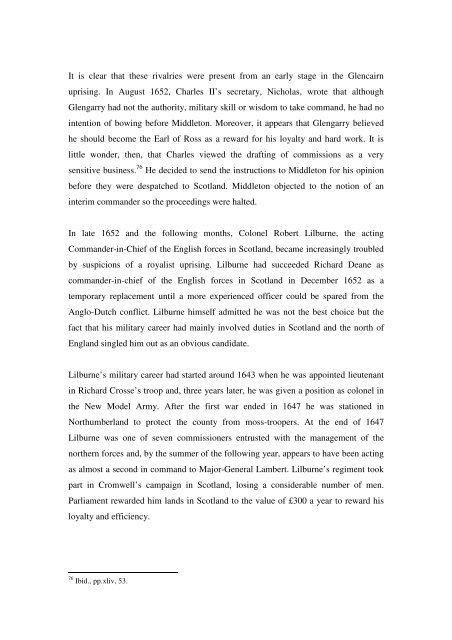The Glencairn Uprising, 1653-54 Helen Baker Department of ...
The Glencairn Uprising, 1653-54 Helen Baker Department of ...
The Glencairn Uprising, 1653-54 Helen Baker Department of ...
Create successful ePaper yourself
Turn your PDF publications into a flip-book with our unique Google optimized e-Paper software.
It is clear that these rivalries were present from an early stage in the <strong>Glencairn</strong><br />
uprising. In August 1652, Charles II’s secretary, Nicholas, wrote that although<br />
Glengarry had not the authority, military skill or wisdom to take command, he had no<br />
intention <strong>of</strong> bowing before Middleton. Moreover, it appears that Glengarry believed<br />
he should become the Earl <strong>of</strong> Ross as a reward for his loyalty and hard work. It is<br />
little wonder, then, that Charles viewed the drafting <strong>of</strong> commissions as a very<br />
sensitive business. 76 He decided to send the instructions to Middleton for his opinion<br />
before they were despatched to Scotland. Middleton objected to the notion <strong>of</strong> an<br />
interim commander so the proceedings were halted.<br />
In late 1652 and the following months, Colonel Robert Lilburne, the acting<br />
Commander-in-Chief <strong>of</strong> the English forces in Scotland, became increasingly troubled<br />
by suspicions <strong>of</strong> a royalist uprising. Lilburne had succeeded Richard Deane as<br />
commander-in-chief <strong>of</strong> the English forces in Scotland in December 1652 as a<br />
temporary replacement until a more experienced <strong>of</strong>ficer could be spared from the<br />
Anglo-Dutch conflict. Lilburne himself admitted he was not the best choice but the<br />
fact that his military career had mainly involved duties in Scotland and the north <strong>of</strong><br />
England singled him out as an obvious candidate.<br />
Lilburne’s military career had started around 1643 when he was appointed lieutenant<br />
in Richard Crosse’s troop and, three years later, he was given a position as colonel in<br />
the New Model Army. After the first war ended in 1647 he was stationed in<br />
Northumberland to protect the county from moss-troopers. At the end <strong>of</strong> 1647<br />
Lilburne was one <strong>of</strong> seven commissioners entrusted with the management <strong>of</strong> the<br />
northern forces and, by the summer <strong>of</strong> the following year, appears to have been acting<br />
as almost a second in command to Major-General Lambert. Lilburne’s regiment took<br />
part in Cromwell’s campaign in Scotland, losing a considerable number <strong>of</strong> men.<br />
Parliament rewarded him lands in Scotland to the value <strong>of</strong> £300 a year to reward his<br />
loyalty and efficiency.<br />
76 Ibid., pp.xliv, 53.
















